—story and photos by Ross Courtney
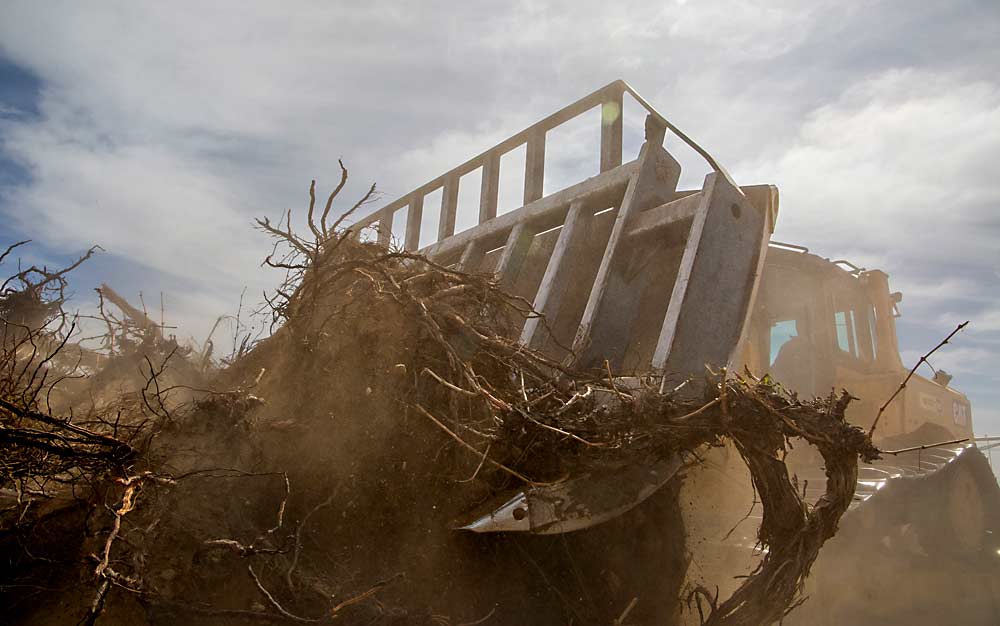
A lot of vines are coming out. Meanwhile, the wine grape industry is prioritizing sustainability.
The intersection of those two trends in Washington blessed Bacchus and Dionysus vineyards, owned by Sagemoor Vineyards and located north of Pasco.
Ten semitrucks full of salvaged trellis posts, anchors and training stakes fell in the laps of viticulturist Brittany Komm and vineyard manager Victor Perez Jr. for pennies on the dollar compared to new infrastructure.
“This was pure luck,” Komm said.
Of course, Komm and her crews now must sort through a mountain of twisted metal to pick out the pieces straight enough to reuse. They will sell the rest to a recycling center and use the money to pay for work crew parties, she said.
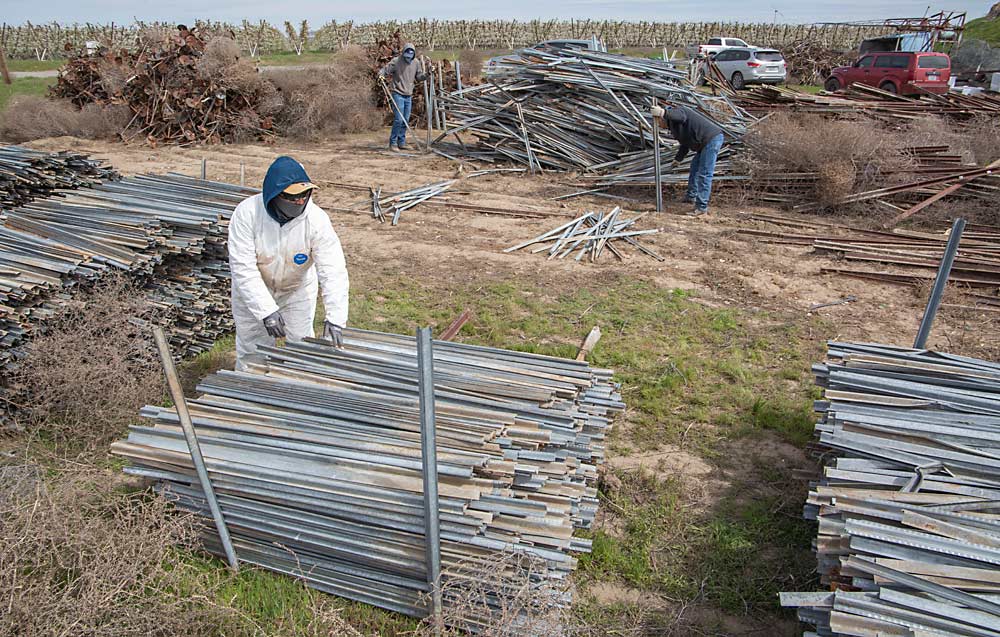
The haul came from Horse Heaven Hills acreage once destined for Ste. Michelle Wine Estates, the state’s largest wine company that last year began cutting about 40 percent of its volume. Since then, growers have been hiring excavators to rip out acres by the thousands. At the same time, state industry officials are touting Sustainable WA, a new third-party certification label that vouches for the sustainability of a producer’s environmental, labor and economic practices.
The confluence of current events put sustainable vineyard removal and recycling in the spotlight.
The Sustainable WA standard only briefly covers vine removal, and even then, the focus is on redevelopment: Replace depressions, test soil for plant-parasitic nematodes, spot-treat weeds, build new roads with erosion control measures. With the program’s focus on vineyard operations, it does not cover salvaging trellis infrastructure.
Sustainable WA was written with continuous improvement in mind, said Colleen Frei, the executive director of the Washington Winegrowers Association, which operates the program. Reusing trellis material when possible, even if not mentioned directly, fits the mission of the pursuit of best practices for sustainability, she said.
“It is entirely in line with the concept of a Sustainable WA program,” Frei said.
Removing trellis infrastructure to be reused can be done, said Todd Chapman, viticulturist for a Horse Heaven Hills vineyard and a member of the Sustainable WA technical committee. It just takes more care.
Excavators can grab the tops of posts and pull them out straight, especially if the ground is wet. Posts that stick up above the vines are easier, of course, but careful crews can nudge cordons out of the way to preserve the shorter posts, too. Drip tube and wiring can also be reused, depending on how old it is.
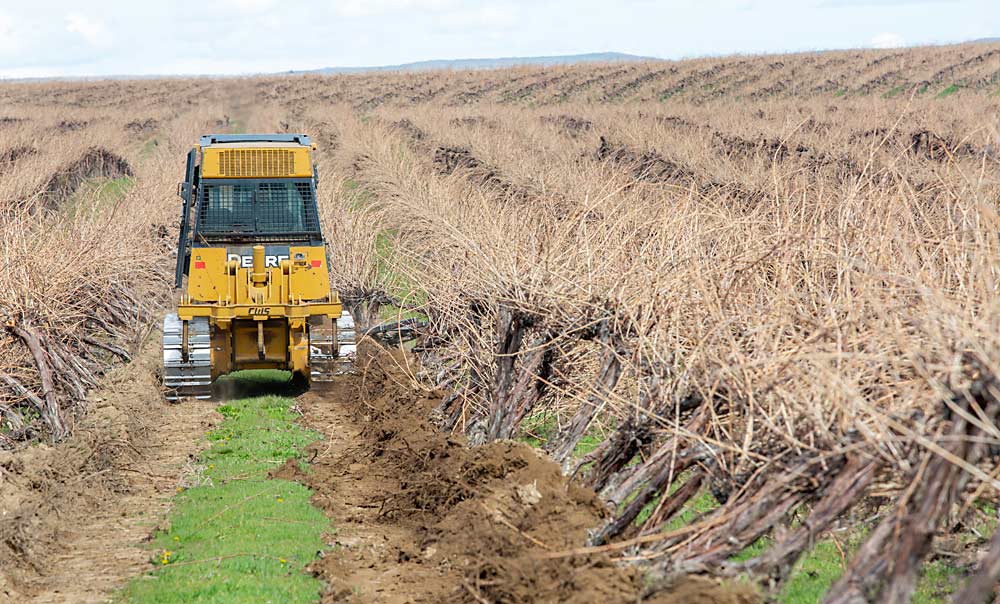
The devil is in the cleanup, Chapman said. Paying an employee to reroll drip tube and sort through used material may not be economically sustainable for a vineyard, he cautioned.
“These aren’t hard and fast rules,” he said. “It’s complicated.”
Perez, the vineyard manager for Bacchus and Dionysus, has been known to reuse catch wires for blocks he knows will be replanted. He and his team just drag them unspooled into a neighboring block and drag them back in when the new vines are ready.
Northwest Farm Service normally focuses on orchard removal, but the wine grape industry’s cutbacks have led to a spike in vineyard requests, said Clark Deaton, who owns the Yakima Valley company with his brother. By the end of the year, they plan to excavate more than 1,000 acres of wine grapes, roughly three times over a normal year.
Most growers pile up vines to burn them, but the company’s chipping service is becoming more popular, Deaton said. Outside investors don’t want even the hint of fire risk or environmental problems, so they hire Northwest Farm Service to run vines through horizontal grinders, which also remove most entangled wires. The company then sells the ground material for mulch or potting soil amendments.
“It’s getting harder and harder for anyone to get burn permits,” Deaton said.
Not everybody looking to recycle gets as lucky as the Bacchus and Dionysus vineyards.
That haul came from young vineyards that fell victim to Ste. Michelle’s cuts, said Adam MacHugh, a cherry grower taking on some excavation work as a side hustle. That makes things easier to reuse, he said.
“Some of them didn’t have grapes on them yet,” he said. •

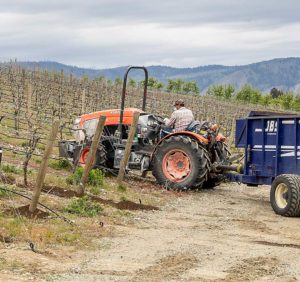
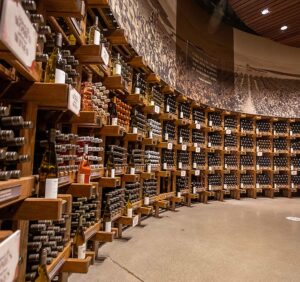





Leave A Comment